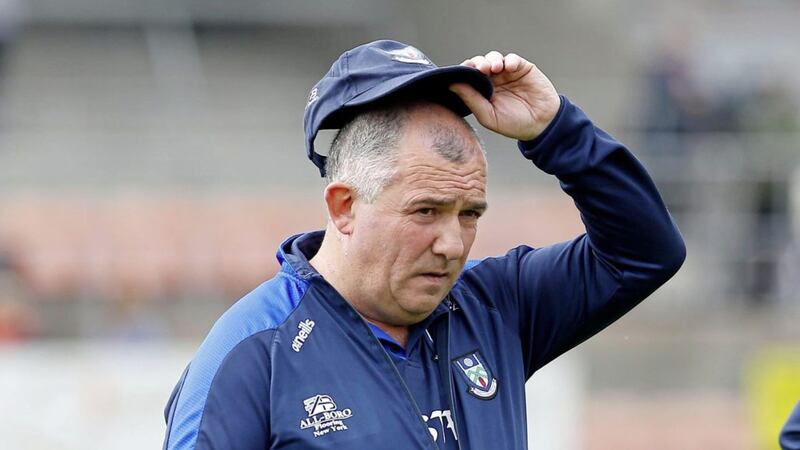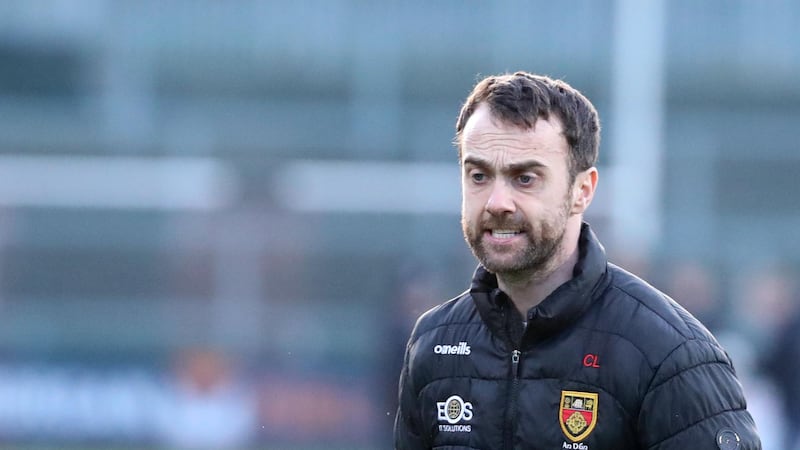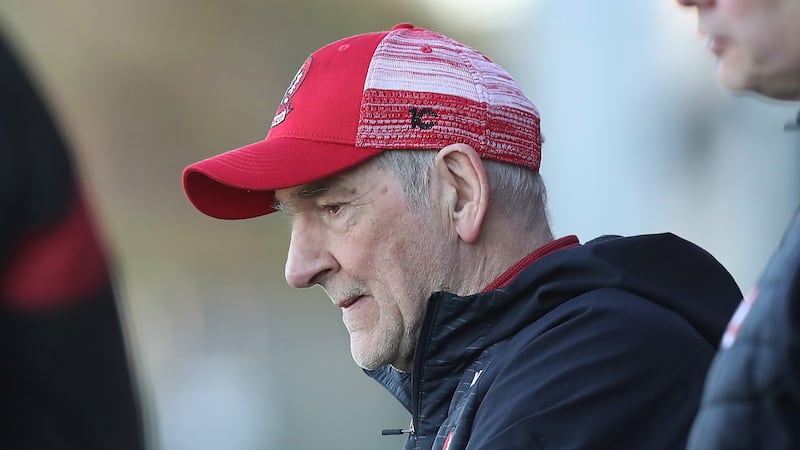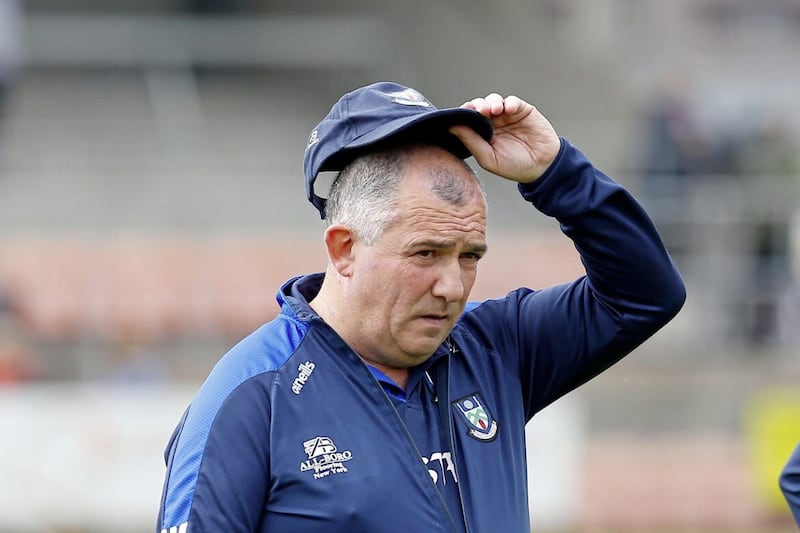IT was of little surprise when the breaking news dropped on social media on Wednesday afternoon that Seamus McEnaney was stepping down as Monaghan manager.
Whether it was the right time to go, only the Monaghan players and ‘Banty’ himself can answer that.
But, from the outside looking in, it seemed the right time.
From the tumultuous finish against Dublin in the National League to the disastrous day against Derry in the Athletic Grounds, Monaghan never looked equipped to rehabilitate themselves through the Qualifiers, and so they bowed out to Mayo, with ‘Banty’ tearing strips off the officials for their failure to award his side a penalty in the game.
After breezing past an out-of-sorts Down side, their first proper Ulster test was always going to be against Derry.
For ‘Banty’, it was a day to forget on the sidelines.
From the opening seconds, Derry boss Rory Gallagher roared onto the pitch to his players and probably in the direction of the Monaghan management team: ‘No sweeper… no sweeper’.
It was as if Gallagher was pointing out the folly to the entire ground.
Press reporters in the overspill area at the back of the main stand certainly heard the Fermanagh man.
Monaghan paid the ultimate price.
When a team is calibrated like Derry are, you’d be wise to mirror it, otherwise you’ll end up in trouble.
Derry defended with 15 players and attacked with 15. It was difficult to discern what Monaghan were doing that day.
They defended with 12 players and got some of their match-ups went badly wrong.
You don’t get away with those kinds of tactical errors on Championship day.
Not against Rory Gallagher. Not against a group of players that has game intelligence in every sector of the field.
And so Gareth McKinless waltzed in for a handy major with only a token challenge on him, and before half-time Benny Heron plundered Monaghan’s backs for another goal.
Derry dictated the terms of engagement from start to finish. In the second half Monaghan’s muscle memory brought them within range a couple of times, but the defeat was soul-destroying.
Should McEnaney have begun the transition process that’s needed in the Monaghan senior set-up earlier?
Mickey Harte was in the same boat several seasons after their third All-Ireland win in 2008. But there is always the nagging fear of throwing the baby out with the bathwater.
So you retain the experienced heads as opposed to investing in work-in-progress footballers who are new to the scene.
And why would you dispense with some of these warrior hearts that have served Monaghan football with distinction?
They’re a county renowned for getting the absolute maximum out of the meagre resources at their disposal. Few footballers in Monaghan slip through the net.
It’s only when this golden era ends that people will reflect on just how seismic their achievements have been.
But, you see, their epitaph hasn’t quite been written yet, largely because they keep coming back and have remained competitive on the national stage ever since Paul Finlay’s flukey winner in the 2005 Division Two final against Meath at Croke Park.
As the ‘Noughties’ progressed there was something wonderfully defiant and obdurate about them.
Deep down, they knew they weren’t as good as Kerry or Tyrone – but it never stopped them from dining at the top table and crashing into some illustrious names while they were there.
When ‘Banty’ bowed out the first time at the end of 2010, he’d left enough of a team and dug deep foundations that allowed Malachy O’Rourke to capitalise and win two Ulster titles in 2013 and 2015.
In 2018, they came desperately close to winning place in the All-Ireland final in 2018. Tyrone, at least at Croke Park, always seemed to have the measure of them.
'Banty' is one of life's great survivors.
He would take any challenge on, even if the odds for success weren't great, as was resoundingly the case in Meath and Wexford.
An owner of some bars and night-clubs, the property crash hit people like him hardest but you always got the sense in any off the record conversations at press events that he never lost a night's sleep over it.
"I'm a survivor,' he'd say with a roguish grin.
In more recent times, the phone conversations dried up.
He became reclusive in his dealings with the press, but on match-day – win, lose or draw – the old rogue wouldn’t be far from the surface.
The press enjoyed their jousts with Banty.
He returned to the Monaghan senior post in 2019 in another bid to win that elusive Anglo-Celt Cup, only to be denied again by the narrowest of margins against his nemesis Tyrone last year.
It’s hard to think of a more passionate GAA man than ‘Banty’. You always had an acute sense of just how much he loved being a part – an integral part – of Monaghan GAA and the responsibility that came with it.
After their unforgettable Ulster semi-final win over Armagh in Newry last year, he was close to tears in paying tribute to Brendan Og Duffy, former Monaghan U20 captain, who’d been tragically killed in a road accident the night before.
After easing past Down in their Ulster opener earlier this season, he ignored journalists’ opening questions about their victory and remembered school girl Aoibhe Byrne who’d died following a tragic accident the previous week.
“Before we start guys,” he said at pitch-side of St Tiernach’s Park, “my first thoughts are with Aoibhe Byrne and the Byrne family of Magheracloone.
“I was at her wake yesterday evening, a 14-year-old girl. It’s devastating for the club. She was a huge supporter of Monaghan and my thoughts and prayers are with those people.”
Seamus McEnaney is one of a kind: charismatic, blunt, funny, roguish.
We need more of his ilk in the inter-county game that has become increasingly dour and anodyne.
No-one would’ve begrudged the Corduff man had he won an Ulster title in either of his managerial stints with his native county, but his legacy in Monaghan runs deeper than mere silverware.
In more unfashionable days, he was the man who did the hard yards and transformed a county by sheer force of will.
His name remains top of the pile in Monaghan GAA.








